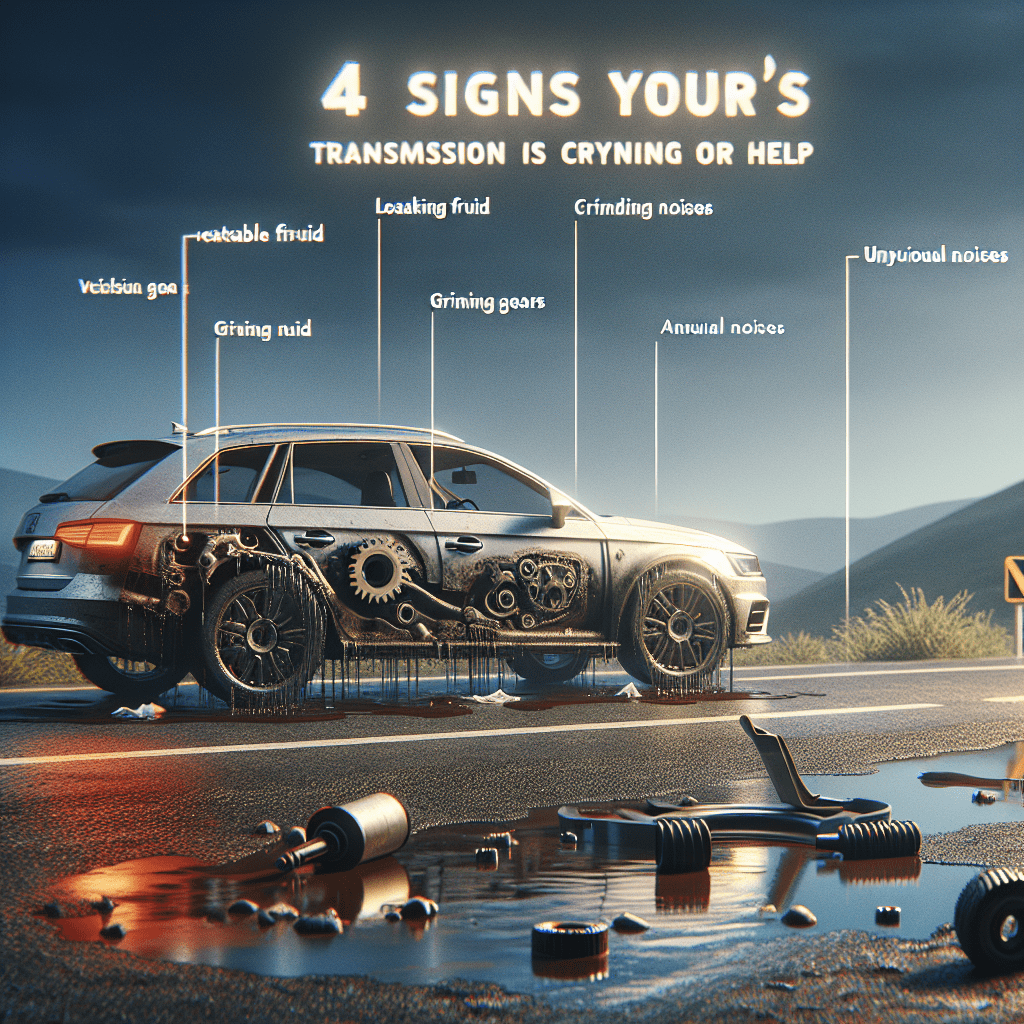Top 5 Transmission Warning Signs Every Car Owner Should Recognize
When it comes to maintaining a vehicle, understanding the signs of a troubled transmission is crucial. The transmission is the heart of your car’s drivetrain, responsible for converting the engine’s power into motion. Ignoring its cries for help can lead to costly repairs or even a complete replacement. To keep your car running smoothly, here are the top five transmission warning signs every car owner should recognize.
Firstly, one of the most telltale signs of transmission distress is unusual noises. If you hear a humming, buzzing, or whining sound, especially when your vehicle is in neutral, this could indicate that your transmission fluid is low or that there are worn parts within the transmission itself. These sounds are your car’s way of saying that something isn’t right under the hood, and it’s time to pay attention.
Secondly, a red flag that is hard to ignore is transmission fluid leaks. Transmission fluid is typically bright red, clear, and has a slightly sweet smell. If you notice a pool of this fluid under your car, it’s a clear sign that your transmission has a leak. Low fluid levels can lead to increased friction and overheating, which can cause significant damage to your transmission over time. Therefore, it’s important to address leaks promptly to avoid further complications.
Thirdly, another symptom that should prompt immediate concern is slipping gears. If your car unexpectedly slips out of gear while driving, or if it struggles to shift gears, this is a sign that your transmission is not functioning properly. This can be caused by a variety of issues, including worn gears, a faulty transmission band, or degraded transmission fluid. Gear slipping is not only a transmission issue but also a serious safety concern, as it can lead to a loss of control while driving.
Fourthly, a car that hesitates or refuses to go into gear is signaling a problem with the transmission. When you shift from park to drive, there should be an immediate response. Any delay or unusual jerking motion during this process suggests that the transmission is struggling to engage the gears correctly. This hesitation can be due to low fluid levels, a malfunctioning transmission sensor, or internal wear and tear.
Lastly, the check engine light is often misunderstood as a general warning, but it can specifically indicate transmission problems. Modern vehicles are equipped with sophisticated computer systems that monitor the performance of the car. When the check engine light illuminates, it’s an indication that the vehicle’s computer has detected an issue, which could very well be transmission-related. It’s essential to have the codes read by a professional to pinpoint the exact problem.
In conclusion, recognizing these five warning signs can save you from the inconvenience and expense of major transmission repairs. Unusual noises, fluid leaks, slipping gears, hesitation to shift, and the check engine light are all cries for help from your car’s transmission. As a friendly reminder, regular maintenance and prompt attention to these signs can extend the life of your transmission and ensure your vehicle remains reliable on the road. Don’t ignore these warnings; your car, and your wallet, will thank you for it.
Car Maintenance Tips: Identifying Transmission Issues Before It’s Too Late

Title: 5 Signs Your Car’s Transmission is Crying for Help
When it comes to car maintenance, the transmission is often overlooked until it’s too late. However, being proactive and recognizing the early signs of trouble can save you from costly repairs down the road. Your car’s transmission is a complex mechanical system that controls the application of power from the engine to the driveshaft. It experiences more wear and tear over time than most other parts of your vehicle due to the heat and friction produced by its many moving and interacting components. Here are five telltale signs that your car’s transmission may be on the brink of a breakdown.
Firstly, if you notice your car is having trouble shifting gears, it could be a clear indicator of transmission distress. Whether you drive an automatic or manual, gears should shift smoothly without any jarring noises or hesitation. Difficulty in shifting could manifest as a delay in acceleration when you press the gas pedal, or the car might jerk or struggle to get into gear. This is often accompanied by a feeling that the gears are slipping instead of engaging securely, which can be particularly noticeable when you’re accelerating or driving uphill.
Secondly, unusual noises can be a red flag that should not be ignored. If you hear whining, clunking, or buzzing sounds coming from your car when it’s in neutral, it’s time to pay attention. These sounds may indicate that your transmission fluid is low or that there are worn out parts within the transmission itself. It’s important to address these noises early on, as they can quickly lead to more significant issues.
Thirdly, a telltale sign of transmission trouble is leaking fluid. Transmission fluid is crucial for keeping transmission components lubricated and cool. If you spot a bright red, brown, or black fluid under your car, it’s likely that your transmission is leaking. A leak not only causes the transmission to overheat but can also lead to significant internal damage. Regularly checking for leaks can help catch this problem before it escalates.
Fourthly, a burning smell emanating from your car is a serious warning sign. This odor could indicate that your transmission fluid has overheated and broken down, leading to an increase in friction and corrosive activity within the transmission. The fluid’s primary job is to prevent these issues by lubricating and cooling the transmission, so when it fails to do so, the entire system is at risk.
Lastly, if your transmission warning light illuminates, it’s a direct signal from your car’s onboard diagnostic system that there’s a problem. While it might be tempting to ignore such warnings, doing so can lead to more severe damage. The light could signify anything from a simple sensor issue to a need for a major repair, so it’s best to get it checked out by a professional as soon as possible.
In conclusion, your car’s transmission is essential for a smooth and efficient driving experience. By staying alert to these signs—trouble shifting gears, unusual noises, leaking fluid, a burning smell, and the transmission warning light—you can catch potential problems early and avoid the inconvenience and expense of a transmission failure. Regular maintenance, such as checking the transmission fluid level and getting periodic flushes, can also extend the life of your transmission. Remember, being attentive to your car’s needs is not just about preventing breakdowns; it’s about ensuring your safety and the longevity of your vehicle.
When to Seek Transmission Repair: Understanding the Critical Signs of Failure
Title: 5 Signs Your Car’s Transmission is Crying for Help
When it comes to maintaining your vehicle, understanding the signs of a troubled transmission can mean the difference between a simple repair and a full-blown, costly replacement. Your car’s transmission is a critical component that ensures the power from the engine is transferred to the wheels in a controlled manner. Like any other part of your vehicle, it can wear down over time, and catching issues early is key. Here are five telltale signs that your car’s transmission may be on the brink of failure and why you should not ignore them.
Firstly, if you notice your car is having trouble shifting gears, it’s a clear signal that your transmission is in distress. This can manifest as a delay or hesitation when changing gears, or you might feel the car jerk or shudder during the shift. These symptoms suggest that the transmission is struggling to find the right “gear” and could be due to a variety of issues, including low transmission fluid, worn gears, or even a faulty transmission control module.
Secondly, another red flag is unusual noises coming from your car when in neutral. If you hear whining, clunking, or buzzing sounds, it’s time to pay attention. These noises can indicate that your transmission fluid is dirty or low, which can cause the internal components of the transmission to grind against each other, leading to significant damage if not addressed promptly.
Thirdly, a transmission that’s crying for help might also manifest through a burning smell. This acrid odor can be a sign of overheating transmission fluid, which not only means that the fluid’s effectiveness is compromised but also that the transmission itself is working too hard and getting too hot. Overheated fluid can lead to increased friction and corrosion of parts, and in severe cases, it can cause the transmission to seize up completely.
Fourthly, the presence of a bright red, brown, or black fluid under your car can be a sign of a transmission fluid leak. Transmission fluid is essential for lubricating and cooling the moving parts inside your transmission. A leak can lead to low fluid levels, which can cause all sorts of problems, from slipping gears to total transmission failure. It’s important to address leaks as soon as they’re spotted to avoid more extensive damage.
Lastly, if your car’s transmission warning light illuminates, it’s a direct call to action. This light on your dashboard is connected to sensors that monitor the performance of your transmission. When something goes awry, the light comes on to alert you. While it might be tempting to hope it’s a fluke and ignore it, doing so could lead to more serious issues down the line.
In conclusion, your car’s transmission is a complex and vital component that requires regular maintenance and prompt attention when something seems amiss. Ignoring the signs of a failing transmission can lead to a less reliable vehicle and more expensive repairs in the future. If you experience any of these symptoms, it’s crucial to seek transmission repair from a qualified mechanic. Early detection and intervention can save you time, money, and the headache of being stranded on the side of the road. Remember, a healthy transmission means a happy car, and a happy car means a happy driver.

